The Clarkdale Review: Intel's Core i5 661, i3 540 & i3 530
by Anand Lal Shimpi on January 4, 2010 12:00 AM EST- Posted in
- CPUs
Adobe Photoshop CS4 Performance
To measure performance under Photoshop CS4 we turn to the Retouch Artists’ Speed Test. The test does basic photo editing; there are a couple of color space conversions, many layer creations, color curve adjustment, image and canvas size adjustment, unsharp mask, and finally a gaussian blur performed on the entire image.
The whole process is timed and thanks to the use of Intel's X25-M SSD as our test bed hard drive, performance is far more predictable than back when we used to test on mechanical disks.
Time is reported in seconds and the lower numbers mean better performance. The test is multithreaded and can hit all four cores in a quad-core machine.
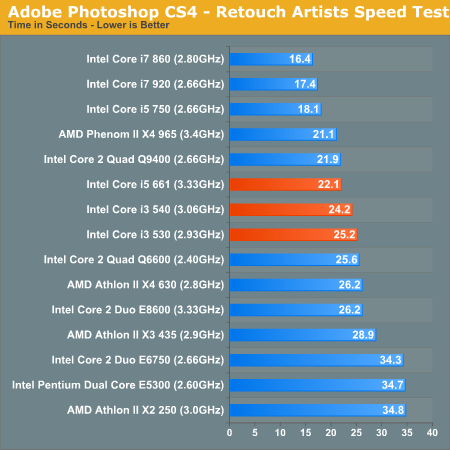
And this is where everything changes. While our Photoshop test won't keep four cores busy 100% of the time, it's enough to give the quad-core CPUs an advantage. Here the Core i5 661 is around the speed of a Q9400 but nowhere near the similarly priced Lynnfield Core i5 750.
The Core i3 540/530 are valuable as they are both able to outperform AMD's similarly priced Athlon II X4 630. The 661 doesn't make sense here but for the price, the i3 530/540 look promising.
DivX 8.5.3 with Xmpeg 5.0.3
Our DivX test is the same DivX / XMpeg 5.03 test we've run for the past few years now, the 1080p source file is encoded using the unconstrained DivX profile, quality/performance is set balanced at 5 and enhanced multithreading is enabled:
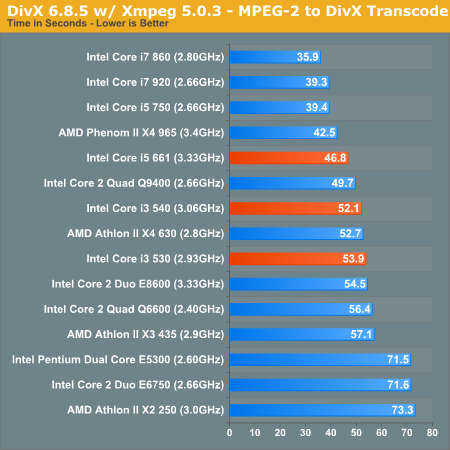
Video encoding is where you need more cores, and this is where the Core i5 661 really loses out in terms of value. It's the same price as a Core i5 750 but it's clearly slower. Turbo isn't saving the 661.
The Core i3 540 and 530 however look competitive. They're able to perform at around the same level as AMD's Athlon II X4 630, while drawing much less power.
x264 HD Video Encoding Performance
Graysky's x264 HD test uses the publicly available x264 encoder to encode a 4Mbps 720p MPEG-2 source. The focus here is on quality rather than speed, thus the benchmark uses a 2-pass encode and reports the average frame rate in each pass.
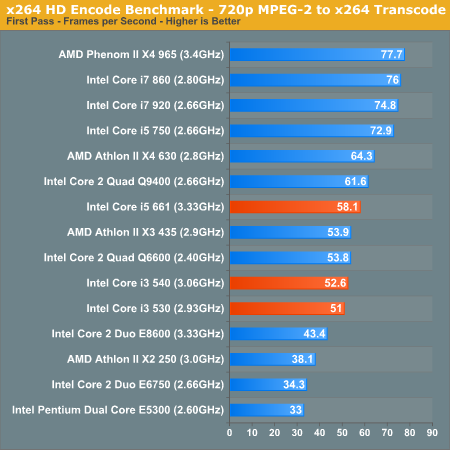
Competitive in DivX encoding, yes. But in our x264 encoding test, these Clarkdales just don't make sense. If you do a lot of x264 video encoding you're going to want Lynnfield or a quad-core Athlon II/Phenom II.
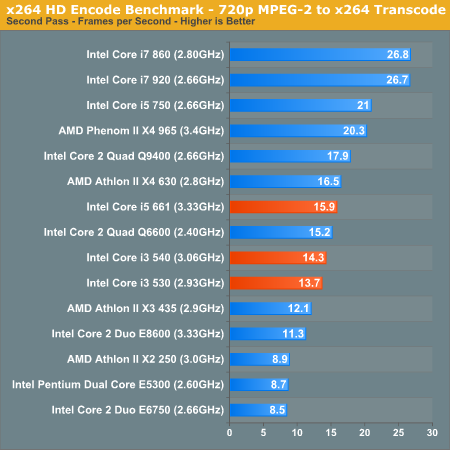
Windows Media Encoder 9 x64 Advanced Profile
In order to be codec agnostic we've got a Windows Media Encoder benchmark looking at the same sort of thing we've been doing in the DivX and x264 tests, but using WME instead.
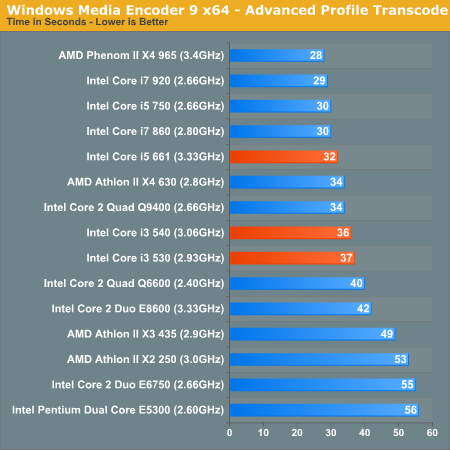
Rounding out our video encoding tests Windows Media Encoder 9 doesn't really show us anything different. The Core i5 661 is slower than it should be given its price, and here even the i3s lose out. If you do a lot of encoding, you want four cores. Simple as that.










93 Comments
View All Comments
Marcin - Monday, January 4, 2010 - link
2D loadAnand Lal Shimpi - Monday, January 4, 2010 - link
The Radeon HD 5870 is quite power efficient if it's not running a 3D app. Our load tests were done using our x264 encoding benchmark to stress the CPU. That's why I used the 5870 as a companion in those benchmarks - makes overall system power consumption lower so we can better see differences between CPUs. Good job AMD :)Take care,
Anand
yacoub - Monday, January 4, 2010 - link
Intel gives us this crap instead of 32nm P55.DrMrLordX - Monday, January 4, 2010 - link
Can we see results on an i3 530 instead? Some people with ES chips are reporting that i3s are not good for much of anything over 4 ghz. Also, the vcore on your 4.8 ghz is pretty high, even with water cooling. I would not want to run an i3 at that vcore on a daily basis.The phase results are really interesting, but I have to wonder how well this chip scales given the memory speed limitations you run into at higher BCLK.
Spoelie - Monday, January 4, 2010 - link
First CPU-Z screenshot on the overclocking page shows CPU @ 1.3GHz, I don't think this is the correct shot?Rajinder Gill - Monday, January 4, 2010 - link
Speedstep and Turbo enbaled. The full load speed is 26X149 BCLK, so around 3874MHz..Spoelie - Monday, January 4, 2010 - link
True, comment on gaming benchmarks:" the Core i3s are good gaming chips - especially when you consider how far you can overclock them. "
But how would you know, not having any in-house?
Anand Lal Shimpi - Monday, January 4, 2010 - link
I've heard some very good initial results but I will be able to confirm when I get back from CES :)Take care,
Anand
marc1000 - Monday, January 4, 2010 - link
Suddenly it all makes sense. Intel would never enable 1080p decoding on Atom D510 not because of technical issues, but simply because it would kill the market for i3 even before it was released. The HTPC market does not need the i3 brute-power, but this is the only platform that will have HDMI and 1080p. If Atom D510 could do 1080p and had HDMI output then the choice for a HTPC would be a no-brainer. And excuse me, but I already have a gaming rig, so all I want right now is a HTPC to play PC content on my TV. And I won't buy a core i3 to do that, but I would buy a decent Atom board if it had the required HDMI and 1080p... so, for me, no HTPC for now...Kjella - Monday, January 4, 2010 - link
That is why the old Atom + ION exists, excellent setup with 1080p acceleration and HDMI out. If you don't want it, wait until AMD or VIA/nVidia manages to work something out.